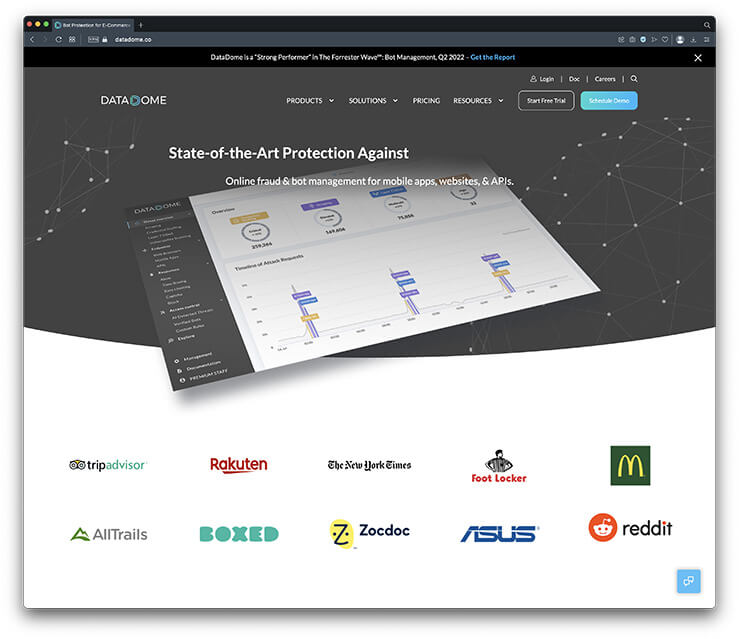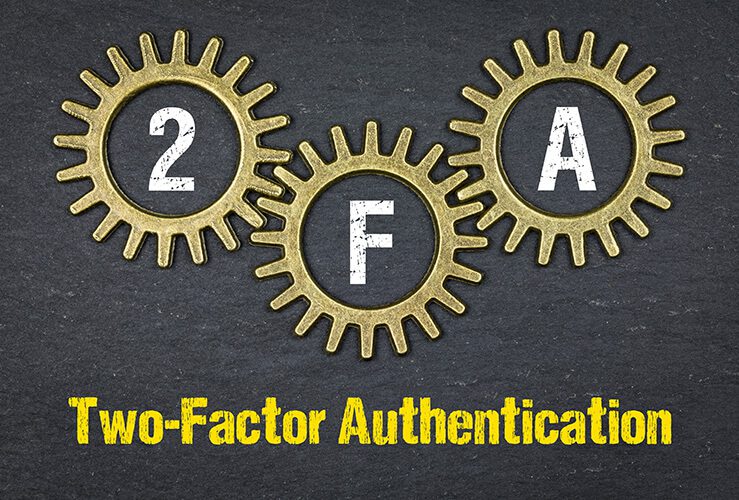
Article
13 Ways To Ensure Website Security In 2024
PUBLISHED:July 19, 2022
UPDATED:December 20, 2023
To keep your business safe online, you must ensure website security in 2022. This article will discuss the steps you need to take to protect your website from hackers and cybercrime. Follow along to learn how to keep your website secure.
1) Implement Security Detection Systems and Applications
One of the best ways to ensure website security is to implement security enhancement systems and applications. These tools can help identify potential security issues and provide valuable insights into the overall safety of a website. Businesses can ensure their online presence is safe and secure.
Security Enhancement Systems (SES) and Applications include firewalls, intrusion detection and prevention systems, activity monitoring, e-commerce fraud prevention software, and encryption. Firewalls are a barrier between a trusted and untrusted network, such as the Internet.
Intrusion & Prevention Systems detect and prevent unauthorized access to networks and systems. Activity monitoring tracks and logs all activity on a network or system. You can check out Seons detailed information to learn more about monitoring tracks and logs and fraud analytics.
E-commerce fraud prevention software helps protect your e-Commerce website from fraud, and encryption is used to protect data in transit so that it cannot be read by anyone who does not have the proper key. By using these tools, businesses can ensure that their data is secure and their networks are protected from attack.
2) Use Strong Passwords and Change Them Frequently
To enhance your security, use strong passwords and change them frequently. A strong password should be at least eight characters long and contain uppercase and lowercase letters, numbers, and symbols. It’s also important to avoid using words or phrases such as “password” or your date of birth.
Additionally, you should change your passwords frequently, ideally every three months or sooner. While this may seem like a hassle, changing your passwords regularly is essential to protecting your information in an increasingly digital world, especially if you always save your website details in cookies, because hackers can easily access them.
This rule should also be extended to your social media accounts and any other online platforms that you regularly use.
3. Install an SSL Certificate for Encryption
SSL certificates encrypt website data, making it difficult for hackers to access sensitive information. An SSL Certificate is a digital certificate that authenticates the identity of a website and encrypts information sent to the server using SSL technology.
SSL Certificates are used by millions of websites to protect online transactions and data transfers. Installing an SSL Certificate on your website has numerous benefits, including:
- Improved search engine rankings: Google has stated that they give preference to websites that use SSL encryption, so installing an SSL Certificate can improve your website’s ranking in search results.
- Improved customer trust: Customers are more likely to purchase from a website that uses SSL encryption, as they know their personal and financial information is safe. Displaying an SSL Certificate on your website can increase customer confidence and boost sales.
We regularly provide hosting for our clients which includes automatic SSL certificates with wildcard support covering all subdomains.
4. Regularly Update Your Website’s Software & Plugins
Website security is essential for any website owner. Regularly updating your website’s software and plugins can help protect your site from potential security threats. Hackers are constantly finding new ways to exploit website vulnerabilities, and by keeping your software up to date, you can make it more difficult for them to succeed.
In addition, updates often include new features and bug fixes that can improve the overall performance of your website. So not only will updating software & plugins help to keep your website secure, but it can also help to improve its performance.
As a part of our SLA (Service Level Agreement), we update WordPress CMS core and plugins every month to help keep our client’s websites secure and running smoothly.
5. Backup Your Website Data Regularly
In today’s digital world, website data is more important than ever. That’s why it’s critical to backup your website data regularly.
Several website security risks can lead to data loss, including hacking, malware, and power outages. By backing up your information regularly, you can ensure that you have a copy of your website in case your accounts have been taken over or hacked.
There are several ways to backup website data, including cloud storage, external hard drives, and tape backups. No matter which method you choose, test your backups regularly to ensure they are working correctly. By taking these steps, you can protect your website data and keep your business running smoothly.
Our hosting plans include automatic daily backups with hourly and external backup add-on options.
6. Restrict Access to Your Website’s Administrator Area
Hackers are constantly looking for new ways to gain access to sensitive data, and one of the most common ways they do this is by compromising administrator accounts. If a hacker can gain access to your website’s administrator area, they will be able to make changes to your website without your knowledge or permission.
As a result, it is essential to protect your website’s administrator area from unauthorized access. One way to do this is to restrict access to the administrator area by requiring a username and password.
Additionally, you can use an IP address whitelist to ensure that only authorized users can access the administrator area. These steps can help keep your website safe from hackers and malicious actors.
7. Educate Your Staff on Cybersecurity Best Practices
You must educate your staff on cybersecurity best practices as a business owner. Educating your employees on website security can help protect your business from cyber-attacks. Here are a few tips to get you started:
- Teach your employees to create strong passwords and never reuse them.
- Encourage your employees to use two-factor authentication when available.
- Make sure your website is running the latest version of SSL.
- Educate your employees on phishing scams and how to avoid them.
- Teach them how to keep the payment gateways on the website secure and how they can be misused.
8. Enable Two-Factor Authentication on all of Your Online Accounts
Another best way to protect your website is to enable two-factor authentication (2FA) on all your online accounts.
2FA adds an extra layer of security by requiring you to confirm your identity with a second code before being able to access your account. This code can be generated by an app on your phone or sent to you via text or email.
While 2FA does add an extra step to the login process, it’s well worth the few seconds it takes to ensure that your information remains safe and secure.
Our hosting tools allow for the enabling of authenticator-based 2FA for extra security.
9. Hide Your Login URL
Another great way to improve website security is to hide your login URL. By hiding your login URL, you make it more difficult for hackers to find and exploit vulnerabilities in your website.
There are a few different ways to hide your login URL. One way is to use a permalink structure that does not include the word “login.” Another way is to use a plugin that hides the login page from view. Regardless of your chosen method, hiding your login URL is a simple and effective way to improve website security.
Once you have been through the web design & development process with us, we can host your website with our secure provider and force non-standard login URLs for CMS access.
10. Use a Secure Web Host
When it comes to website security, one of the most important things you can do is choose a secure web host. A secure web host will have features to help protect your website from hacks, malware, and other cybersecurity threats. They will also have experienced staff who can help you troubleshoot any security issues.
In addition, a secure web host will provide you with regular backups of your website so that you can recover your data in the event of an attack. Choosing a secure web host is essential in keeping your website safe and protecting your business from potential cyberattacks.
We only use hosting solutions that are optimised for WordPress (our prefered CMS platform) and use the best tools to keep your website secure from hackers.
11. Change the CMS Default Settings
The default settings for a content management system (CMS) are usually not enough to protect your website from all potential threats. To help keep your website safe, it is crucial to change the CMS default settings to suit your needs better.
If you are in control of your hosting solution, this can be done by adding additional security plugins, configuring user permissions, and changing the database prefix. These extra steps can help ensure your website is better protected against security threats.
With our own hosting solutions, we change the settings within WordPress to help keep our client’s websites more secure. We tend to advise against adding plugins because we can never completely vet their authenticity, but if we did, then we would likely recommend WordFence.
12. Avoid Errors That Can Expose Your Website Sensitive Details to Third-Parties
Website security is essential to avoid errors that can expose your website’s sensitive details to third parties. There are many website security risks, but some of the most common include SQL injection, cross-site scripting, and session hijacking.
To help protect your website, keep all software up to date, use strong passwords, and limit access to sensitive information. These precautions can help ensure that your website is safe from security threats.
13. Provide Less Detailed Error Messages
Our final tip to help improve website security is to provide less detailed error messages. That way, if an attacker does manage to get access to your website, they will not be able to easily find out what went wrong and how to exploit it.
In addition, less detailed error messages can also help to improve website accessibility, as they are less likely to confuse or frustrate users trying to visit your site. Ultimately, providing less detailed error messages can help to improve both website security and website accessibility.
Conclusion
That’s it! These are the essential steps you need to take to ensure your website is secure in 2022:
- Implement Security Detection Systems and Applications
- Use Strong Passwords and Change Them Frequently
- Install an SSL Certificate for Encryption
- Regularly Update Your Website’s Software and Plugins
- Backup Your Website Data Regularly
- Restrict Access to Your Website’s Administrator Area
- Educate Your Staff on Cybersecurity Best Practices
- Enable Two-Factor Authentication on all of Your Online Accounts
- Hide Your Login URL
- Use a Secure Web Host
- Change the CMS Default Settings
- Avoid Errors That Could Expose Your Website Sensitive Details to Third-Parties
- Provide Less Detailed Error Messages
Following these guidelines can protect your site from various threats and keep your data safe.
There are other strategies for ensuring the security of your websites, but we feel that the above are the most important.
Talk to us about a new website & hosting security




